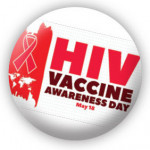German AIDS researchers have found a protein in semen that raises the infectious potential of HIV 100,000-fold, according to an article in the San Francisco Chronicle (sfgate.com, 12/14).
The Chronicle notes that scientists at Germany’s University of Ulm were screening molecules from semen samples, looking for some that naturally blocked HIV. They instead found protein fragments that exponentially increased the virus’s transmissibility.
“I was so surprised that I did not believe the numbers,” said Dr. Frank Kirchhoff, at the University of Ulm. “But we did the experiment multiple times, and the results were always the same.”
Some experts hope that the discovery of the protein could help in the development of a microbicide, a vaginal cream or gel that could protect sex partners from contracting HIV. Others, the Chronicle adds, feel that the results are a long way from offering any practical benefits.
“It is a surprising finding, but I would be cautious about how important this is going to be,” said Dr. Tony Fauci, director of the National Institute for Allergy and Infectious Diseases. He said that sexual transmission is only one means of HIV infection, and that other factors—such as genital ulcers caused by diseases including herpes and syphilis—also play a role in transmission of HIV.
Protein in Semen Raises HIV Transmission Risk






4 Comments
4 Comments